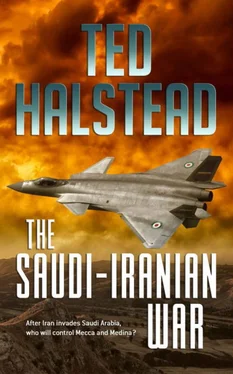Ted Halstead - The Saudi-Iranian War
Здесь есть возможность читать онлайн «Ted Halstead - The Saudi-Iranian War» весь текст электронной книги совершенно бесплатно (целиком полную версию без сокращений). В некоторых случаях можно слушать аудио, скачать через торрент в формате fb2 и присутствует краткое содержание. Год выпуска: 2019, Издательство: Independently published, Жанр: Боевая фантастика, Триллер, на английском языке. Описание произведения, (предисловие) а так же отзывы посетителей доступны на портале библиотеки ЛибКат.
- Название:The Saudi-Iranian War
- Автор:
- Издательство:Independently published
- Жанр:
- Год:2019
- ISBN:нет данных
- Рейтинг книги:4 / 5. Голосов: 1
-
Избранное:Добавить в избранное
- Отзывы:
-
Ваша оценка:
- 80
- 1
- 2
- 3
- 4
- 5
The Saudi-Iranian War: краткое содержание, описание и аннотация
Предлагаем к чтению аннотацию, описание, краткое содержание или предисловие (зависит от того, что написал сам автор книги «The Saudi-Iranian War»). Если вы не нашли необходимую информацию о книге — напишите в комментариях, мы постараемся отыскать её.
The Saudi-Iranian War — читать онлайн бесплатно полную книгу (весь текст) целиком
Ниже представлен текст книги, разбитый по страницам. Система сохранения места последней прочитанной страницы, позволяет с удобством читать онлайн бесплатно книгу «The Saudi-Iranian War», без необходимости каждый раз заново искать на чём Вы остановились. Поставьте закладку, и сможете в любой момент перейти на страницу, на которой закончили чтение.
Интервал:
Закладка:
Hamid would admit, though, that he didn’t particularly look forward to facing a Saudi Abrams tank in his Zulfiqar-3.
Hamid had talked to an Iraqi tank commander who told him that though they had bought T-90s as a reaction to American annoyance at several M1A2 tanks ending up in the hands of Shiite militia forces, the T-90s actually had some pluses. First, at 2.5 million US dollars the T-90 cost less than half as much as an Abrams tank. It had better gas mileage, and was a target about thirty percent smaller than the M1A2. Its internal filters required cleaning much less often. Also, unlike the M1A2 version sold to the Iraqis the T-90 came equipped with reactive armor, giving it a much better chance of survival against rocket-propelled grenades and anti-tank rockets, even the TOW-2.
Iran had produced dozens of the new Karrar tank, which was intended to match the T-90’s performance. However, problems with both the Karrar’s engine and its reactive armor made Hamid pleased his corps had decided to buy T-90s instead.
The single T-14 Armata was supposed to be an opportunity for Iran to decide whether it wanted to buy more of them, rather than the far cheaper T-90s. Hamid knew there was no chance Iran would spend the money required, and didn’t even believe they were really necessary.
Hamid also strongly suspected the Russians’ real purpose for making the Armata available to Iranian forces in Syria was to gain information on the tank’s combat performance without risking Russian troops, or the tank’s reputation. Russia had already sold T-14s to India and Egypt, and clearly saw it as an export cash cow. Anything that went wrong with the T-14’s performance in the hands of Iranian soldiers could be blamed on their incompetence, while any successes would be credited to Russian engineering.
Hamid shrugged. The truth was that if they didn’t cost more than twice as much as a T-90, he would have wanted the T-14 instead. It had automated defenses against incoming rounds that had proved effective against both rocket-propelled grenades and anti-tank missiles. It wasn’t clear how well those defenses would do against tank shells, but fortunately the rebels had very few of those.
The Armata could fire a wide range of ammunition, though here the rebels’ lack of tanks had made using many of the rounds pointless. The anti-tank guided missile called the Sprinter had been developed specifically to take advantage of the greater energy of the T-14’s 125mm smoothbore main gun, and had an effective range of up to twelve kilometers. The Vacuum-1 armor-piercing fin-stabilized discarding sabot round had a penetrator that could punch through nearly a full meter of rolled homogeneous armor (RHA) equivalent, meaning no tank’s armor should be able to defeat it. Using either on anything but a tank, though, was like using a sledgehammer to kill a fly — a very expensive sledgehammer.
Hamid was looking forward to explaining their mission to his troops, because it guaranteed them the chance to finally use the Armata’s impressive capabilities, as well as giving all of them a chance at a place in Paradise. He was also realistic enough to think it was likely most of them would be going there directly.
As a city, both Abdul Rasool and Farhad Mokri agreed the best adjective to describe Cairo was “overflowing.” Its cafes, restaurants, streets and public squares were always packed with people. The largest city in the Middle East with a population of over nine million, the Cairo hotel room they were sitting in provided one of the few possibilities for a truly private meeting. Once they had swept the room for listening devices, of course.
Abdul looked thoughtful. “I don’t think striking Saudi oil production will be enough to guarantee the overthrow of the regime.”
Farhad shrugged. “Well, I wasn’t entirely convinced the last time, but didn’t want to discourage you. I still think it would be an excellent start.”
Abdul nodded. “I have an idea for an additional step, but for maximum impact it will need to happen at exactly the same time as the strike on petroleum production.”
Farhad laughed. “Well, we wouldn’t want to make this too easy, would we? So, the second step?”
“Strike at Saudi water production,” Abdul said confidently.
Farhad frowned. “Is that really practical? I’ve read that the Saudis are getting most of their water from desalination plants, and that they have over two dozen.”
Abdul smiled. “Actually, they have twenty-seven. But that’s a misleading number. Twenty-one plants are on the Red Sea coast, and most of their production goes to Jeddah, Mecca and Medina. There are six plants along the Persian Gulf coast, and most of the production from four of them goes to Dhahran and Dammam. Two plants, Jubail II and Ras al Khair, produce nearly two-thirds of all the desalinated water in Saudi Arabia. Nearly all of it is piped straight to Riyadh.”
Farhad stared at Abdul in shock. “Almost two-thirds of their entire water production?”
Abdul’s smile grew even broader. “About two million cubic meters per day. Jubail II was the largest desalination plant in the world when it opened in 2009, and Ras al Khair took over that title when it opened in 2014. And many of the groundwater wells that provide the only other available water have run dry. It’s true that eventually enough water to keep people drinking would make it to Riyadh, even if they have to truck it in from other plants. But when everyone in Riyadh turns the taps in their kitchens and showers and nothing comes out, I think we can count on panic.”
Farhad frowned. “Surely the Saudis realize how vulnerable they are with so much depending on just two plants. Are there no planned backups?”
Abdul nodded vigorously. “Yes, there was a plan for a large solar-powered desalination plant to be built jointly by the Saudi government and a Spanish company, Abengoa.”
Farhad’s frown deepened. “And?”
Abdul smiled. “In 2015 Abengoa filed for bankruptcy.”
Farhad nodded. “Ah. And you think my uncle can help us with this project too.”
Abdul smile broadened, and he said, “Well, yes, Farhad. I think he can.”
“Ok, you were right. They are following us,” Abdul Rasool said with a grimace. “Do you have any idea how long they’ve been on our tail?”
Farhad Mokri shrugged, and shook his head. “That’s just one of the many questions I plan to ask them.”
Abdul snorted with suppressed laughter as they continued to walk down a crowded street in the center of Cairo. “And what makes you think they’ll answer? Either one looks like he could take on both of us.”
Farhad smiled. “Because we’re not alone. Now, be quiet while I use this Bluetooth earpiece to finalize arrangements to receive our uninvited guests.”
Farhad continued to smile as he spoke in a low voice to his unseen friends, while continuing to look at Abdul and gesture as though his words were intended for him. Abdul concentrated on looking engaged in the conversation and occasionally nodding, while a part of his mind couldn’t help thinking how odd this all was.
Finally, Farhad gestured for them to turn left into an alley. They had nearly reached its end when the two men appeared behind them. Being careful not to look behind them, Farhad and Abdul turned left out of the alley into another main street.
The two Russian agents were well trained, and knew an obvious spot for an ambush when they saw it. The problem was that they were looking ahead, behind, and on both sides.
They weren’t looking up.
Which is where the sniper was waiting. To be fair, this was no ordinary sniper, and his weapon was just as unusual. He had been trained by the Mukhabarat, the Egyptian secret police. When he joined the Muslim Brotherhood after his conversion to what he now thought of as “true Islam” he had taken the rifle and its ammunition supply with him. Since he knew he’d never get more rounds, both he and the leaders he reported to were very particular about his targets.
Читать дальшеИнтервал:
Закладка:
Похожие книги на «The Saudi-Iranian War»
Представляем Вашему вниманию похожие книги на «The Saudi-Iranian War» списком для выбора. Мы отобрали схожую по названию и смыслу литературу в надежде предоставить читателям больше вариантов отыскать новые, интересные, ещё непрочитанные произведения.
Обсуждение, отзывы о книге «The Saudi-Iranian War» и просто собственные мнения читателей. Оставьте ваши комментарии, напишите, что Вы думаете о произведении, его смысле или главных героях. Укажите что конкретно понравилось, а что нет, и почему Вы так считаете.












